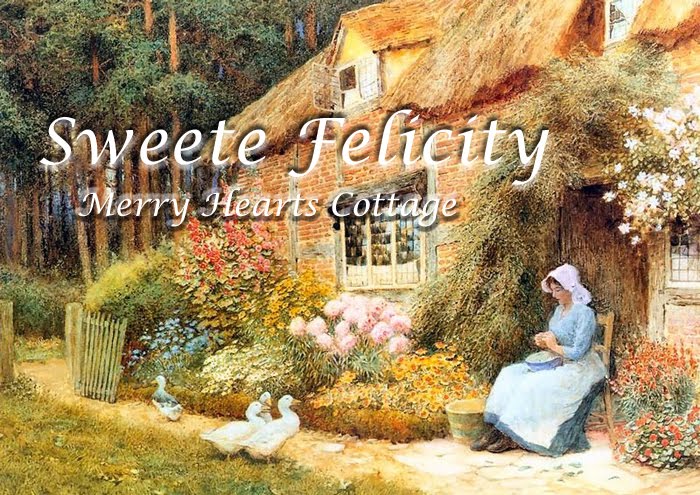This is a little late for "New Year's", but still very thought-provoking.
It is from the Mother's Magazine, January 1908.
(Images are coming!)
This is the month of the New Year.Far up at Tomsk, in the Northland world, where civilization is scant, and people battle with the elements to exist, the cry will ring out on the natal day:
"God be with you: peace to us all!
"The spirit back of that cry, given as it is at one of the outposts of the world, has been termed by Henry Drummond "the lower ledge."
In every home, in every school, church or field of other work, there exists alower ledge. For that matter, it is on this ledge that the riches, not only of material things, but spiritual ones, are found.
The Kimberley diamond mines are wonderfully rich. Gold flows in marvelous quantities from the fields of South Dakota and the ranges of Alaska and the Andes. The South Seas yield their treasures of pearls, and Indian waters those of coral.
But none of these material things are found on the surface of the earth. The depths must be uncovered to find them. The diver must sink himself in the waters a hundred or more feet, and the miner a thousand or more, to find the sparkling reward for industry. On the lower ledge, far below the ordinary surface of the earth or its waters, the gift for valiant effort is uncovered.
"And," wrote Dummond, "this being true of things that pertain to matter, it is also true of what belongs to the soul. Our keenest, truest feelings are not those on the surface, but those which develop in the depths through patience, suffering, self-denial, love of our fellow-men."
Let us, therefore, on the New Year Day, strike deep to the lower ledge of our our better nature, find there a jewel, and bestow it upon our neighbhor, that for him the natal time may be as full of hope as it is to us. Let us not give him the husk of the surface of ourselves, but the richness from the lower ledge of all our experiences with life and God. So shall we truly serve the one God."
Every new salute in the moving procession of the years, every passing of the old and coming of the New, leaves clearer the evidence that humanity is giving with the changes, greater thought to humanity.
"And the word 'humanity,'" wrote Drummond, "is not complex in its meaning. it is the child at your knee, the neighbor across the way, the servant at the table, the king on his throne, and the peasant at the plow. It is the church around the corner, the school on the hill top, the home whose eaves shade you, the community in which you live. Humanity is yourself and your touch with others."
A one-legged beggar, hobbling through the streets of London on a snowy New Year's night, accidentally stumbled against the great Disraeli, who, missing his cab, had started to make his destination on food. The beggar fell, but even as he did so, he cried out:
"I beg pardon, sir. 'Twas my fault--sure, I didn't mean to bump you.
"The statesman bent over him, helped him up, brushed the snow from his clothes, handed him some change, and, as he passed on, cried out:
"A Happy New Year!--it was not your fault."The beggar hobbled after him, caught up, put out a hand to his greatcoat, detained him, with the plea:
"Not for the change, sir, you gave me, but who'd wish me 'Happy New Year'?"
"A friend," answered Disraeli, and was gone.
In those two words he gave a jewel from the lower ledge to one who needed the kindly touch.When men of all degrees thus meet their fellow-men, and the cheer of the soul-deep word is given, we may well think of the little child, who, even in the joy of the festal day, is still stumbling. It is not quite yet certain of those feet whose true way is still more or less obscure. Some very early faiths are beginning to tremble. Some illusions, rose-colored, are changing to gray or black. The little one is groping, a hand not yet unfriendly seeking one that will be kind and firm.
Shall the child, the unformed citizen, a future worker, perhaps ruler among men, be denied a single one of the riches that lie on the deep, lower ledges of our own broad experiences? There is the playground beckoning it on one side, the school and church on the other, the coming duties to state and God, and at this moment the crisp air, the winter-spangled stars, filled with the carols of a New Year.
There is that, within the depths of our own natures, which may guide this child, month after month, through New Year after New Year, into the full fruition of a life of humane, helpful toil. Taking from the best of ourselves what we have to give, the child may join that to what it gains of its own effort, and so perfecting itself-find every New Year but a swift step forward to that moment when not hours, but the results of honest labor, mark the passing of eternity.
"Let us not," wrote Drummond, in the closing days of his earthly life, "forget what we have on the lower ledge for the child, to the honor and the glory of the kingdom of God."
Monday, January 28, 2008
Sunday, January 20, 2008
Pretty Lingerie and natty Clothes Help to Make the Mother, and Not Harm Her

Here is yet another reminder to "put a little pretty in it"!
From Mother's Magazine, 1909
Madame Recamier once said: There may be an excuse for a foolish man, possibly, but for a foolish woman-never! That is why women who fail are never forgiven."
No point in my recent article on lingerie implied extraordinary expense on the part of any mother in making herself attractive; the poorest mother can follow those suggestions, and by the use of a little common sense--a quality innumerable mothers lack--benefit by the advice.
But it seems to be a foregone conclusion with thousands of mothers that if they are not dowdies their maternal characteristics are lost forever.
A philosopher of the past, having made a life study of women, declared his researches led to the conclusion that the knowledge of being well dressed gives a woman contentment. Not only did he say that "dress makes a difference," but that, so far as the majority of womankind is concerned, dress makes all the difference between success and failure--a sense of being properly clothed imparting a repose and confidence that inspires triumph or overcomes defeat.
I believe this. I have sold women pretty clothes and homely clothes too long not to know that the woman who buys pretty lingerie or outer clothing, even if it is inexpensive, has far the better spirits and mind than the woman who clings to "homely" things because they are cheap. They are not cheap, when all considerations are figured out.They cost more in humiliation and self-respect than even then wrong-thinking buyer can imagine.
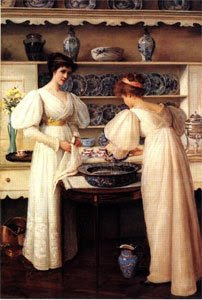
An eminent nerve specialist has declared lately that "the wearing of becoming clothes is a mental stimulus to men and women alike." According to his theory a good suit of clothes acts as a tonic, and few people can do themselves justice unless they are well dressed. He argues that shabby, ill-fitting clothes are a constant source of worry which frets away one's energies and takes the keen edge off one's wits. In short, if one would scale the heights of victory, it is essential to have the support of good clothes.
There is a great truth of theory upon which tasteful dressing is based.; for what woman, if possessed in the smallest of the instinct of dress, does not recognize the shabby condition of mind and body that is the effect of being badly gowned, carelessly groomed and generally "down at the heel"?
The direct personal influence of dress upon its wearer is answerable for half the fretful discontent and ennui from which thousands of women suffer-a happy, optimistic outlook upon life being incompatible with the dowdy environment of ill-fitting clothes. The woman who delights in dainty things may well fret herself into a fever of discontent if forced to wear unbecoming clothes, but her whole outlook upon life is changed and brightened by the possession of tasteful gowns and dainty accessories. These tend not only to make her infinitely better-pleased with herself and the world, but to endow her with confidence, which inspires vivacity.
The great pity is that the effect of clothes upon one's temperament has not been more generally recognized long ago. Had the matter been more seriously considered, it would have so altered circumstances that instead of being persistently taught, from our youth up, that to be good we necessarily must be shabby and dowdy, we might all have been learning to be amiable, witty, charming, and self-confident.
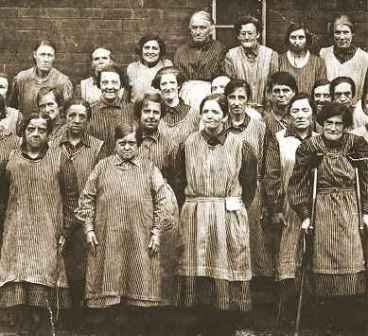
I have never advocated expensive or extravagant dress. The women who over-dress are as miserable as those who do not know how to dress.
I do insist, however, that one may dress very well for little money, look neat and be attractive without having a bank account, and that the real reason why so many mothers do not do so is because they are grossly ignorant of what constitutes good taste and sane economy in dressing.
-Miss May Meehan
Tuesday, January 15, 2008
Handy Household Hints from the Early 1900s

Here are some tips that I've gleaned from various magazines; please use common sense, however, when working with volatile substances!
Save all stale bread to be made into puddings, toast, croutons for soups, or crumbs for rolling croquettes in. Take a little stake cake, slice thin, place in a dish and pour over it some stewed fruit, or a sauce made of vinegar and water, sweetened to taste, flavored with a pinch of cinnamon or nutmeg, and thickened with one or two tablespoonfuls of corn starch, and one has a simple dessert which children, especially, are fond of.
In dressing small children one can utilize garments too badly worn for older people to wear, by making them into neat, serviceable apparel for the little ones. Make the best material into small garments, piece the good scraps into quilts, which may have lining of the same kind of material, while an old woolen or cotton blanket is used as interlining, and cut the small, worn pieces into bits to use for making rugs or carpets. After cutting over knit underwear to make smaller garments, take the larger scraps , lay flat, lap one edge over the other and stitch together, and you have a piece of goods that will do nicely for lining a comfort. Make the little one's stockings out of worn larger ones, and so on.
Furniture polish: to one part turpentine add three parts linseed-oil, shaking the bottle until thoroughly mixed. Apply with a woolen cloth, and do not use too much, or the last state of your furniture will be worse than the first. Put a little one the cloth and rub in thoroughly, then polish with a dry cloth until the oil is entirely absorbed.
To keep raisins from settling to the bottom of the pan, wash them in hot water before putting them into a cake .
Try turpentine in removing a corn, applying every night by means of a toothpick. The corn will come out easily in a very short time.
Chestnut-leaves, steeeped and applied to a burn, will be found very healing and soothing.
Take a piece of clean cloth, tie a spoonful or two of salt in it, and use as a pad to rub the griddle with when frying griddle-cakes. it saves butter and smoke, and the cakes will not burn if attened to.
Hydrogen peroxide on wicker is a great cleaner.
A piece of woolen cloth fastened around the arm of a sewing machine near the needle-bar is handy to stick pins and needles in, instead of throwing them on the table, and then losing time picking them up.
To prevent curtains from becoming soiled by blowing against the screens when the window is open, attach a safety-pin to the hem of curtain and catch it over a small brass hook, screwed to the side of the window at a convenient height.
Now, can you add any?
Saturday, January 12, 2008
New Year's Greetings 1918
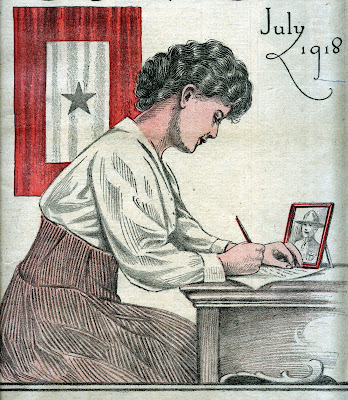
The following is an article from the January 1918 issue of Hearth and Home Magazine. Remember, war shadowed the land during this time.
How rapidly has the wheel of time brought us around to the close of another year, dear sisters, with but few trophies to add to the pages of life. We go on from one day to another, not knowing what the morrow may bring. The span of life is a mere thread when tested against the billows and surges of time--a thread which may be cut short in the bloom of youth, or wear on indefinitely from year to year in the vain pursuit of happiness, whose dreams are more or less beyond the reach of mortal mind. After all, what is happiness? Man, in his original state, could and should have been happy. He was free to roam through Eden's bowers, cull flowers, listen to the songs of sweet birds and drink deep from the fountains of pleasure. In fact, his every wish or desire was anticipated by the Creator of his existence. But alas! was he happy? Did he appreciate his condition? How could he, when he had never partaken of the cup of sorrow? So it is that we must taste of the bitter in order to enjoy the sweet. Joy and sorrow are thrown along the mysterious and untrodden path we call life. An all-wise Creator, the God of wisdom, has placed a veil before our eyes so that we may not penetrate the depths of futurity. What a blessing this is; otherwise our hearts would be filled with sorrow and foreboding, and we should not be able to appreciate the joys which might intervene. There "sufficient unto the day is the evil thereof;" and we can but press on with hearts of cheer to fight the battles and enjoy the blessings as they come. knowing that God is true and just, and that His plans are for the best good of all, we need not fear. It is well we do not or cannot know what the new year has in store for us; we can throw out the anchor of hope and banish doubt and fear. However dark the future may seem, however much we may dread it, let us believe that it may brighten as it draws near. Circumstances and conditions are the molds in which our lives are cast--time alone will reveal the truth. While hope is the inspiration of youth, memory is the solace and comfort of old age. In the quiet stillness of eventide memory brings back the bygone days--reminiscences which may bring to some remorse of conscience, but to others joy and comfort; all are subject to the same law. Many bridges have been crossed, many mistakes made which resulted in sad disappointments. And let me say right here that the one mistake too often made in old age is to give up all right and title to the dear old home. No palace, pomp and splendor can ever fill the the place of that home, perhaps with a thatched roof and moss-covered chimney, with the many scenes around it which the storms of time have made dear, and which still linger bright upon the pages of memory. Let it be ever so humble "there's no place like home." And now it behooves us to bid farewell to the old year, and with hearts of cheer and smiles welcome the new; and may health, happiness and success attend us all.
How rapidly has the wheel of time brought us around to the close of another year, dear sisters, with but few trophies to add to the pages of life. We go on from one day to another, not knowing what the morrow may bring. The span of life is a mere thread when tested against the billows and surges of time--a thread which may be cut short in the bloom of youth, or wear on indefinitely from year to year in the vain pursuit of happiness, whose dreams are more or less beyond the reach of mortal mind. After all, what is happiness? Man, in his original state, could and should have been happy. He was free to roam through Eden's bowers, cull flowers, listen to the songs of sweet birds and drink deep from the fountains of pleasure. In fact, his every wish or desire was anticipated by the Creator of his existence. But alas! was he happy? Did he appreciate his condition? How could he, when he had never partaken of the cup of sorrow? So it is that we must taste of the bitter in order to enjoy the sweet. Joy and sorrow are thrown along the mysterious and untrodden path we call life. An all-wise Creator, the God of wisdom, has placed a veil before our eyes so that we may not penetrate the depths of futurity. What a blessing this is; otherwise our hearts would be filled with sorrow and foreboding, and we should not be able to appreciate the joys which might intervene. There "sufficient unto the day is the evil thereof;" and we can but press on with hearts of cheer to fight the battles and enjoy the blessings as they come. knowing that God is true and just, and that His plans are for the best good of all, we need not fear. It is well we do not or cannot know what the new year has in store for us; we can throw out the anchor of hope and banish doubt and fear. However dark the future may seem, however much we may dread it, let us believe that it may brighten as it draws near. Circumstances and conditions are the molds in which our lives are cast--time alone will reveal the truth. While hope is the inspiration of youth, memory is the solace and comfort of old age. In the quiet stillness of eventide memory brings back the bygone days--reminiscences which may bring to some remorse of conscience, but to others joy and comfort; all are subject to the same law. Many bridges have been crossed, many mistakes made which resulted in sad disappointments. And let me say right here that the one mistake too often made in old age is to give up all right and title to the dear old home. No palace, pomp and splendor can ever fill the the place of that home, perhaps with a thatched roof and moss-covered chimney, with the many scenes around it which the storms of time have made dear, and which still linger bright upon the pages of memory. Let it be ever so humble "there's no place like home." And now it behooves us to bid farewell to the old year, and with hearts of cheer and smiles welcome the new; and may health, happiness and success attend us all.
Thursday, January 10, 2008
Antique Maternity Books
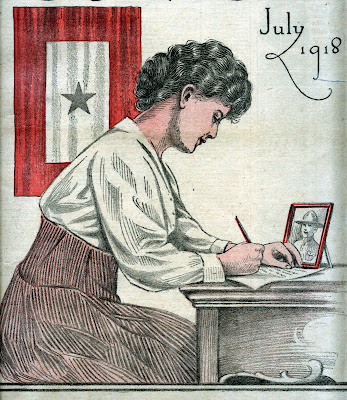
I love to read old books on motherhood when I'm expecting. They are refreshingly different from the "in your face, no holds barred" information so common these days. Two of my current favorites are Ladies Home Companion or Perfect Womanhood by Mary Melondy. I was surprised that she encouraged a fruit diet, even stating that she believed society would eventually evolve to being vegetarianism as more research was done.
I had always suffered horrible gas pains in my chest with my first four babies, but after reading this book, during my third semester I cut down on evening meals and tried to eat fruit and a little sprouted bread as my main foods. The heartburn and pains were kept to a minimum, and he was my easiest birth. Hmmm, maybe hard labors are caused by indigestion!
Here is an excellent quote from the book.
"It is not an idle fancy to say that as the farmer goes down deep into the well for cool water, the mind should go down deep into the resources of life for strength. Life comes from breath. The air contains invisible elements of those things which we eat and is immediately brought into the current of the blood. Let us learn to breath deeper-breathe more freely--study nature--think purer thoughts--practise culture of the body and thus make the temple indeed a fit dwelling place for the soul. We hear no sound of hammer, but the building never ceases."
Friday, January 4, 2008
Book Recommendation: Celebrations by Becky Stevens Cordello
I bought this book several years ago at a thrift store, and have not taken full advantage of it. I am going to keep it handy this year, and use it to plan our holiday festivities.
This would be such a wonderful book, along the lines of Mrs. Sharp's Traditions by Sarah ban Breathnach, to walk through during the coming year. Ms. Cordello has gathered many beautiful illustrations and quotations from antique magazines such as the Delineator.
There are craft projects, party ideas, and historical background for each holiday, even some obscure holidays that deserve to be resurrected.
Although this book was written in the 1970s, it does not have that "Far Out" look that most books of that era have.
This would be such a wonderful book, along the lines of Mrs. Sharp's Traditions by Sarah ban Breathnach, to walk through during the coming year. Ms. Cordello has gathered many beautiful illustrations and quotations from antique magazines such as the Delineator.
There are craft projects, party ideas, and historical background for each holiday, even some obscure holidays that deserve to be resurrected.
Although this book was written in the 1970s, it does not have that "Far Out" look that most books of that era have.
Thursday, January 3, 2008
I Love My Amish Brooms!
I became fed up with the WalMart quality brooms we've been using (and breaking) since we've been married, and ordered 3 brooms from Lehmans.com. One is a milkhouse/outdoor broom, one is a house broom, and the other is a child-sized broom.
They arrived a few weeks ago, and I was amazed that I've been putting up with such cheap things up till this point! The child-sized broom even has a rose sticker on it, and the handles are hand-painted. The wood of the sticks will easilyl outlast the broom straw.
They are such an example of something useful being made beautiful. Now my next step is making them some "aprons", as featured in MaryJane's Ideabook, Cookbook, Lifebook.
They arrived a few weeks ago, and I was amazed that I've been putting up with such cheap things up till this point! The child-sized broom even has a rose sticker on it, and the handles are hand-painted. The wood of the sticks will easilyl outlast the broom straw.
They are such an example of something useful being made beautiful. Now my next step is making them some "aprons", as featured in MaryJane's Ideabook, Cookbook, Lifebook.
Wednesday, January 2, 2008
A New Beginning

I found this in a wonderful book I bought last year called "Bogatsky's Golden Treasury for the Children of God", and wanted to share it today.
January 1st
Hosanna!-Mark xi.9; Ps. cxviii 25-29.
A new sense of time now begins; put up thy Hosanna, O my soul, that the Lord may save, bless and prosper thee. May He grant thee a "Happy new Year" indeed! For this purpose begin it with a dedication of thyself to God. Thy time, circumstances, and life, are in His hand; with faith and love implore His blessings and protection over thee this ensuing year. Begin this, and every following day wih prayer. Let God have thy first thoughts in the mornings; the impression they make will not be easily erased by worldy matters. Grace is promised in the use of means; be thou diligent then, and punctual in the performance of them; let thy daily request be for an increasing knowledge of thyself, and of Jesus Christ in His offices; for a sense of pardoning mercy; for a lively, vigorous faith; for communion wlith the Father and the Son through the Spirit; for true holiness in heart andl ife; for strength and protectino to hold out to the end. Pray for the prosperity of Zion; they prosper that love her. Oh, pray for thy friends and relations, begging the Almighty to take them into covenant relation to Himself; for a blessing on thy worldly affairs; for a sanctified use of health or sickness, prosperity or adversity, as God shall please to send. Perhaps, O my soul, this may be the last year of the Lord's patience, and thy pilgrimage. Is thy state safe? Art thou a real believer in Jesus? Is the oil of grace in thy vessel?
If so thou art prepared for every emergency.
And now, O soul, another year
Of this world's life is past;
I cannot long continue here,
And this may be the last.
Now a new scene of time begins,
Set out afresh for heaven;
Seek pardon for thy daily sins,
In Christ so freely given."
Such beautiful sentiment! The beauty of old language is sometimes overwhelming to me. I hope that I may live up to these sentiments each day of this and every day, living for the Lord, one day at a time.
May you be blessed as well, no matter where your journey may take you.
Subscribe to:
Posts (Atom)
